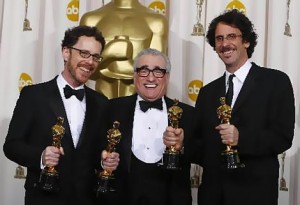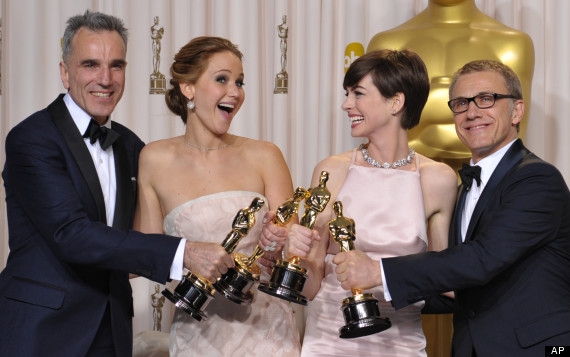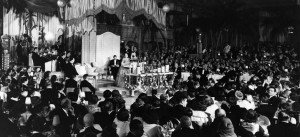Most dedicated moviegoers can agree that the Oscars are the film industry’s most high-profile and solipsistic exercise in self-promotion. Their whole existence is transparently crass and has been from the start. They were initially conceived of as a marketing ploy by industry bigwigs. The annual awards, are a reward for “merit” after a race dominated by tens of millions of dollars in “campaign spending.” Perhaps worst of all, they have given rise to a whole industry devoted to awards-centered navel gazing that takes up nearly half the year. Even if one did ignore all of those sins and just viewed them as a reflection of the taste of Hollywood’s elites then…ye gods. Every year they find new ways to ignore great movies and reward bland or mendacious crap. To view them with disdain is probably the only rational reaction.
And yet, I think the Oscars really do mean something and hold an important place in our cinematic culture. Almost in spite of themselves, the Oscars matter. The more easily defensible reason to love the Oscars is because they encourage the general public to engage with the quality of movies. The Oscars taste may tend towards middlebrow melodramas and biopics, but they still ask anyone watching to ask what movie they preferred and why. Actual critical analysis, of course, should not be based around a horse race mentality. And it’s even more reductive to presume that there can even be a “best” movie. Personal opinions and judgments cannot be reconciled with a term that absolute.

The Oscar wins for these 3 men remain my favorites in 15 years of watching. Not relevant really, I just wanted to include the image.
But all of this is a jumping off point. The rare good choices and innumerable horrendous mistakes of the Academy can and should lead to people engaging with what movies they truly enjoy and why. Personally, I’ve had tons of great conversations about the worthiness of past winners and am looking forward to telling Birdman supporters that their appreciation of that movie is misplaced. <troll dance here>
Those nominations and winners also serve as a useful benchmark for cinematic history. Regardless of how one feels about the worthiness of a particular movie, knowing that it was or was not nominated at the Oscars instantaneously fills you in about how Hollywood responded to it. Knowing that Gone With the Wind won 11 Oscars (I stand corrected; it only won 8. Hat-tip to Peter Barlow – Bean) in 1939 tells you everything about how that movie was received in 1939. On the flip side, the fact that Orson Welles, Alfred Hitchcock, Robert Altman, and Stanley Kubrick all infamously died before the Academy gave them the award for Best Director is just as informative. It’s important to considers the Academy’s various biases against genres and foreign films, but the Oscars are still one of the preeminent markers of political economy in cinematic and cultural history.
Beyond all that, there’s simply the fact that the Oscars feel like they mean something. For all their empty pageantry and ostentation, the Academy represents a career-defining pinnacle for most members of the film industry. For viewers and fans, they represent a more immense moment of glamour and global attention than nearly anything else in popular culture. That becomes even more special when the Academy actually pays attention to films can create a positive impact in society. Think about the excitement that surrounded Brokeback Mountain back in the 2005 season. Its acclaim and popularity were seen (correctly) as a harbinger of wider acceptance of the LGBT community in pop culture. The widespread shock and outrage that followed Crash‘s upset victory was as much disappointment that a positive statement for gay rights and acceptance was missed on such a public stage.

Steve McQueen is a highbrow visual artist and he fucking LEAPT FOR JOY when his film won Best Picture. I’ll take that as an endorsement for my article.
I’ll also admit that while I don’t need the Academy to validate my cinematic opinions, it sure does feel great when they do. Last year’s ceremony, which saw my favorite films of 2013, 12 Years a Slave and Gravity, storm to a collective 10 wins was deeply gratifying. It felt like the planets had aligned and good taste prevailed, to the point that the ceremony’s myriad annual embarrassments were easily forgotten. It also helped that the empty peacock that is American Hustle lost all 10 nominations. Sorry not sorry. Winning feels even better when something you dislike is also losing.
Clearly, not every winner should or can be a cause célèbre or a personal winner, but the Oscars provide a uniquely powerful platform for promoting art and artists. It’s essentially the most visible form of canon construction that the cinema world has. So even if Hollywood gives their awards to self-absorbed crap more often than not, those awards are still worth considering. You should always take the Academy’s taste with a healthy grain of salt, of course, but I’d encourage anyone who enjoys movies to engage with the Oscars and dive further into what the industry holds up as the best of itself.








Please, Oscar is a joke.
Care to elaborate?